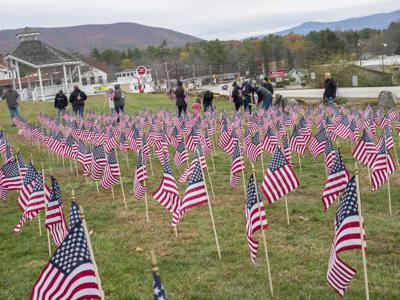As the rate veteran suicide continues to outpace that of the general public, there’s a growing sentiment that the problem isn't one that confined to just veterans and veterans’ organizations. Initiatives such as the nationwide Together With Veterans, and the nascent local organization Lakes Region Veterans Coalition, are seeking to build networks of support that include the civilian community.
Dr. Peggy Laneri, a psychologist who retired after running a counseling center for veterans in Worcester, Massachusetts, said suicide prevention is an effort that can include everyone who knows someone at risk. She said there are certain signs that should prompt concern.
“Isolation is definitely something to be looking out for,” she said, as well as other changes in behavior. Those changes might be repeatedly backing out of activities that a person usually engaged in. In current circumstances, those activities might be walks in the outdoors or virtual hang-outs on Zoom, “and all of a sudden they don’t want to Zoom with you or walk with you.”
If a co-worker calls in sick more than usual, does only the minimum necessary to get through the day, or is quick to display anger, can all be signs of a depressed state, Laneri said.
“A sense of hopelessness, that things are going to end, a sense of negativity or an inability to see the glass as half full,” she added, “If you know them, it’s a change in their personality.”
If such a change is noticed, she suggested that observations be shared with them: “You just say, ‘Hey, I noticed that you haven’t made the last few Zoom calls with the guys, are you OK? It seems that you’re pulling away from our group, or from me. I want you to know that I’m concerned about you, is there anything I can do to help?’ That can mean a lot,” Laneri said.
Free and confidential support is available through the Veterans Crisis Line. Call 1-800-273-8255 and then press 1, text 838255 or chat online at www.veteranscrisisline.net.
Laneri said people in a third-party position won’t be able to force a reluctant veteran to seek help, but a gentle suggestion can sometimes be just what they need.
“You don’t know what’s going to come from your offer to help, but it makes them feel like someone cares. That’s the most you can do,” Laneri said.
Lisa Adams, whose son Chadd took his own life in December of last year, said another thing that everyone can do is call their legislative representatives and plead for more support for veterans’ access to mental health care. In the months prior to his death, Chadd spent weeks waiting for a bed in an in-patient facility, time that she felt was detrimental to his health.
“Whenever possible, reach out to your senators, your government, to increase help for veterans,” Adams said.
To veterans, Adams wants them to know that they are worth the care, and that their burden is not too great for their loved ones to bear.
“I would tell veterans that there are programs out there, there are people who want to help,” Adams said. “And their families are stronger than they think. They are strong enough to help them with their demons. I feel that soldiers feel that they need to shelter them from what they dealt with. I think we’re stronger than they think.”
Added Adams, “If there’s any other way that I can help, I, my husband, my other son, would roll our sleeves up to get these veterans what they need.”


















(0) comments
Welcome to the discussion.
Log In
Keep it Clean. Please avoid obscene, vulgar, lewd, racist or sexually-oriented language.
PLEASE TURN OFF YOUR CAPS LOCK.
Don't Threaten. Threats of harming another person will not be tolerated.
Be Truthful. Don't knowingly lie about anyone or anything.
Be Nice. No racism, sexism or any sort of -ism that is degrading to another person.
Be Proactive. Use the 'Report' link on each comment to let us know of abusive posts.
Share with Us. We'd love to hear eyewitness accounts, the history behind an article.